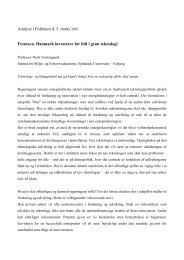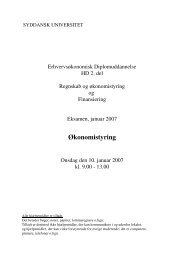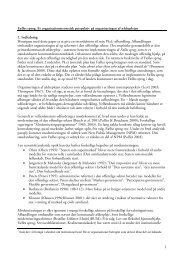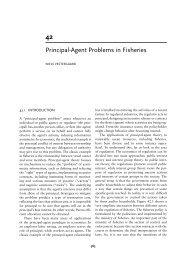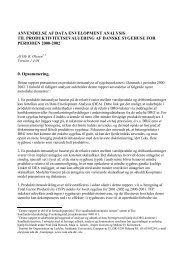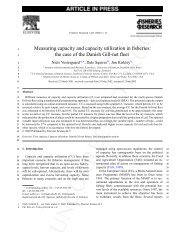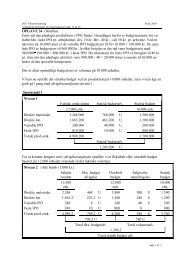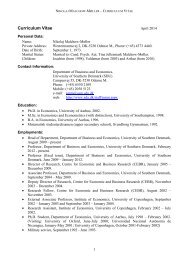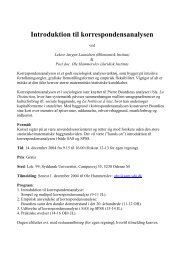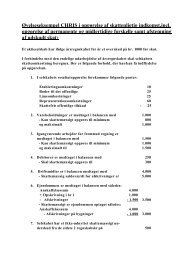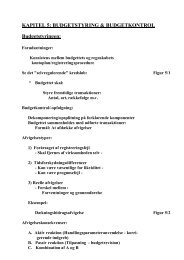Development of Parties and Party Systems in ... - lah@sam.sdu.dk
Development of Parties and Party Systems in ... - lah@sam.sdu.dk
Development of Parties and Party Systems in ... - lah@sam.sdu.dk
- No tags were found...
You also want an ePaper? Increase the reach of your titles
YUMPU automatically turns print PDFs into web optimized ePapers that Google loves.
presidentialism gave rise to “float<strong>in</strong>g parties”, i.e. “parties <strong>of</strong> power” l<strong>in</strong>ked to the oligarchy <strong>and</strong>with easy access to the media <strong>and</strong> established shortly before elections. In the case <strong>of</strong> the CEECs theparties were created top-down, only rarely from voters’ preferences, as these were at best vaguelyformulated. Furthermore, parties were mostly established spontaneously without much knowledgeabout the exact dem<strong>and</strong> for political parties. The programmes <strong>and</strong> policy statements were mostlyvague <strong>and</strong> abstract. The absence <strong>of</strong> clear-cut social <strong>in</strong>terests <strong>in</strong> society shall be seen <strong>in</strong> the light <strong>of</strong>the complex triple transformations <strong>and</strong> the rapidly chang<strong>in</strong>g political <strong>and</strong> economic structures on alllevels <strong>of</strong> society.Despite weak l<strong>in</strong>kages to civil societies the parties captured a central position after the second freeelections. The political parties rema<strong>in</strong>ed badly <strong>in</strong>stitutionalized, but by no means <strong>in</strong>significant.Gradually we were witness<strong>in</strong>g a pr<strong>of</strong>essionalization <strong>and</strong> cartellization <strong>of</strong> the political scene.Because <strong>of</strong> party-ist properties they felt tempted to misuse the new won power. Until then, nonpoliticalactors have played an important role <strong>and</strong> thus to a large extent captured the role otendedfor political parties (”shadow <strong>in</strong>stitutionalisation”). In specific “extraord<strong>in</strong>ary crisis situations”, e.g.Hungary <strong>in</strong> 1995 <strong>and</strong> the Czech Republic after the 1996 election, a de-democratisation, party-ism<strong>and</strong> re<strong>in</strong>forcement <strong>of</strong> old antidemocratic discourses <strong>and</strong> anti-politics has been be observed,detrimental to further consolidation <strong>of</strong> democracy.Contrary to South European countries such as Greece, Spa<strong>in</strong> <strong>and</strong> Portugal, before 1989 the parties<strong>in</strong> the CEECs had neither been able to establish <strong>in</strong>stitutionalised structures <strong>in</strong>ternally nor <strong>in</strong>externally, i.e. <strong>in</strong> exile. Throughout the region the parties have been marked by the communist past,especially by the last stage <strong>of</strong> real socialism <strong>and</strong> the demise <strong>of</strong> the old system. It has to be taken <strong>in</strong>consideration that state socialism developed differently <strong>in</strong> Pol<strong>and</strong>, Czechoslovakia <strong>and</strong> Hungary.Notions such as ”mature post-totalitarian” <strong>and</strong> ”national accommodative” have been used about thestate socialist systems <strong>in</strong> Pol<strong>and</strong> <strong>and</strong> Hungary, <strong>and</strong> ”centralist-bureaucratic” <strong>and</strong> ”frozen posttotalitarian”about the regimes <strong>in</strong> Czechoslovakia <strong>and</strong> DDR (Kitschelt et.al., 1999, L<strong>in</strong>z <strong>and</strong> Stepan,1996).Furthermore, the “break-through” <strong>in</strong> Pol<strong>and</strong> <strong>in</strong> the late 1990s has been named ”pacted transition” or”przemieszczenie” (”common reconstruction”), <strong>in</strong> Czechoslovakia <strong>and</strong> DDR the notion ”implosion”has been widespread <strong>and</strong> <strong>in</strong> Hungary there has been talked about a ”simple exchange”(“rendszerváltás”) af systems, about gradualism <strong>and</strong> an almost consensual “evolution” away fromthe old system.At the beg<strong>in</strong>n<strong>in</strong>g the work as a politician was <strong>of</strong>ten considered as a ”call” or a ”mission”. The newbroad catch-all movement-parties such as Solidarity <strong>in</strong> Pol<strong>and</strong> <strong>and</strong> Civic Forum (OF) <strong>in</strong> the CzechRepublic legitimised themselves by references to the fight aga<strong>in</strong>st the old system present<strong>in</strong>gthemselves as broad catch-all parties. A greatest problem was that the day-to-day needs <strong>of</strong> thepeople became downgraded. The absence <strong>of</strong> close l<strong>in</strong>ks to social <strong>in</strong>terests <strong>in</strong> society was evenconsidered as a virtue, as parties should place themselves above group <strong>in</strong>terests. In the new postcommunistdiscourse the label ”party” was negatively loaded as “parties” for many citiz<strong>in</strong>s wereconnected with the former one-party state. Therefore many new “parties” called themselves”movements”, ”centre”, ”forum”, ”alliance”, ”agreement” or ”union”. Thus, the slogan <strong>of</strong> CivicForum (OF) <strong>in</strong> the Czech Republic was simply: ”<strong>Parties</strong> are for the party-people, Civic Forum is forall”.12



